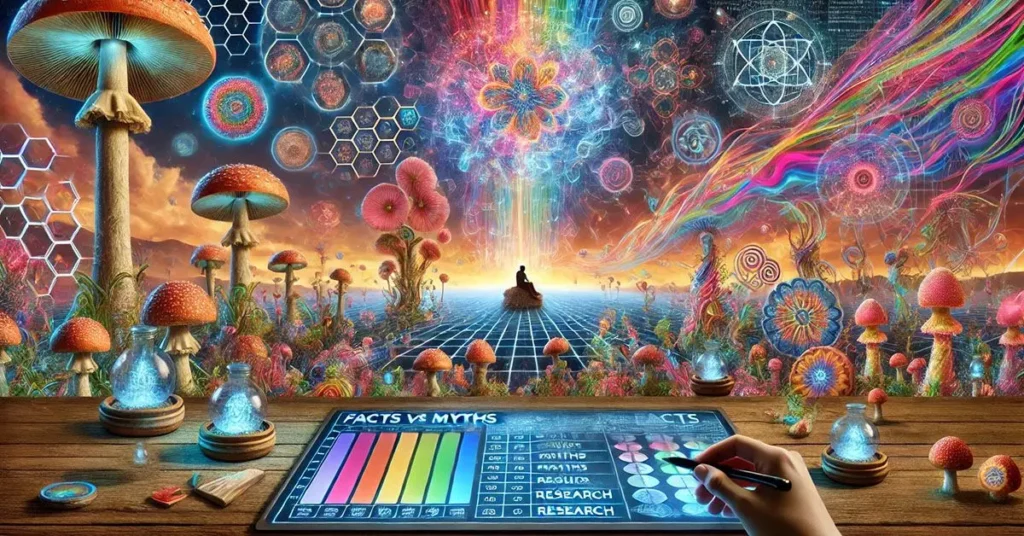Magic mushrooms, often known for their primary psychoactive component, psilocybin, have been surrounded by myths, misconceptions, and misinformation. This article aims to clarify these misconceptions by presenting evidence-based facts from reputable sources. We can foster a more informed public discourse around their use, effects, and potential therapeutic benefits by providing a clearer understanding of magic mushrooms.
Myth 1: Magic Mushrooms Are Highly Addictive
The Truth: Contrary to popular belief, magic mushrooms are not considered highly addictive. Research indicates that psilocybin, the active ingredient in these mushrooms, does not lead to compulsive use or physical dependence. Psilocybin is known to have a low potential for abuse and dependency. According to the Drug Enforcement Administration (DEA) and various clinical studies, psilocybin lacks the reward structure that typically leads to the addiction cycle common in substances like opioids or cocaine.
Myth 2: Magic Mushrooms Cause Brain Damage
The Truth: There is no scientific evidence to support the claim that magic mushrooms cause brain damage. Studies from institutions like Johns Hopkins have shown that psilocybin is safe when taken within a controlled environment and under professional supervision. Psilocybin’s effect on the brain is temporary, often causing alterations in perception and mood for the duration of the “trip,” but not causing any long-term changes in brain structure or permanent damage.
Myth 3: The Effects of Magic Mushrooms Are Merely Hallucinogenic
The Truth: While it’s true that magic mushrooms can cause vivid hallucinations, their effects are not limited to this aspect. Psilocybin has been shown to induce profound changes in consciousness, often leading to spiritual experiences and significant shifts in perspective and personality. Research has suggested that these effects can have long-lasting benefits for mental health, particularly in the treatment of conditions like depression, anxiety, and PTSD. These therapeutic effects are currently being studied in clinical settings, exploring how psilocybin can facilitate deep psychological healing.
Myth 4: Magic Mushrooms Have No Medical Benefits
The Truth: This is perhaps one of the most significant misconceptions about magic mushrooms. Recent studies and clinical trials have increasingly supported the medicinal benefits of psilocybin for various psychiatric and emotional disorders. The U.S. Food and Drug Administration (FDA) has granted “Breakthrough Therapy” designation to psilocybin for the treatment of depression, which expedites the development and review of drugs that may demonstrate substantial improvements over existing therapies.
Myth 5: Magic Mushrooms Are Legal Because They Are Natural
The Truth: The legality of magic mushrooms is complex and varies by region. In the United States, psilocybin is classified as a Schedule I substance under the Controlled Substances Act, which means it is illegal to manufacture, buy, possess, or distribute it. Some cities and states have begun decriminalizing or legalizing their use, but these changes are specific to local jurisdictions and do not alter federal law. The assumption that natural substances are inherently legal is a common misconception; the legality of a substance is determined by law, not by its origin.
Conclusion
The myths surrounding magic mushrooms often overshadow the scientific research and understanding of their potential benefits and risks. As research continues, public perception must align with evidence-based information. Only through informed discussion and policy-making can the benefits of psilocybin be appropriately integrated into medical practice and society at large.
Additional Sources:
- Drug Enforcement Administration (DEA), “Drug Scheduling.” [DEA Drug Scheduling](https://www.dea.gov/drug-information/drug-scheduling)
- Johns Hopkins Medicine, “Psilocybin Research and Therapy.” [Johns Hopkins Psilocybin Studies](https://hopkinspsychedelic.org/)
- U.S. Food and Drug Administration, “FDA Grants Breakthrough Therapy Designation for Psilocybin.” [FDA Psilocybin Breakthrough Therapy](https://www.fda.gov)
By addressing these myths with factual evidence and continued research, we can foster a more accurate understanding and safer use of magic mushrooms in both clinical and personal contexts.
